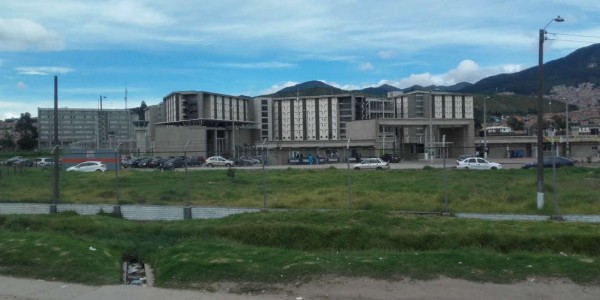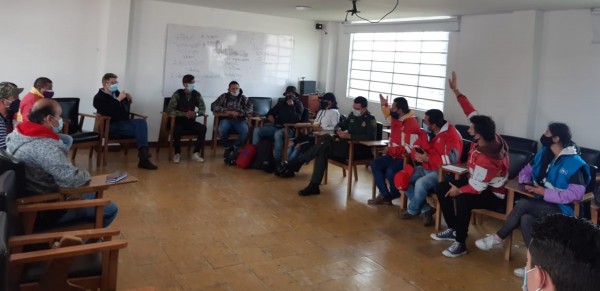
A few weeks ago, the members of the Community of Saint Paul who live and work in Bogotá were involved in a complicated situation that, fortunately, was resolved in a satisfactory way—and it left us with several lessons.
It was Thursday. At noon, a hundred young people from “Primera Línea” (an anti-government protest movement) appeared in La Resurrección neighborhood, where we live. For several months now, members of “Primera Línea” have led numerous marches against various measures of the government on the streets of Bogotá and other cities in the country. They also ask for a change in the Colombian political system.
A neighbor had offered them a vacant lot (located one block away from the parish) so that they could camp there, since they were being evicted from all the places where they had attempted to stay, in other parts of the city. The protesters arrived with several injured men (who had been wounded in their clashes with the police). Some injuries were quite serious. Then, what was predictable happened: the residents of the street where the newcomers wanted to stay did not like the idea, and the tensions, the insults, the attempts of violence began. The media have been reporting the vandalism that has sometimes accompanied the marches, and this caused some neighbors to strongly oppose the idea of sheltering protesters in their neighborhood.
We, upon hearing what was occurring, went to the place and offered a parish hall to attend to the wounded. Then we agreed to initiate a dialogue between neighbors and protesters to appease spirits and prevent all violence. We suggested that the dialogue could take place in the parish. We, as a neutral party, would act as moderators and guarantors of the dialogue. We ended up sitting around a table from three in the afternoon until after eight at night: leaders from “Primera Línea”, neighbors, staff from the mayor's office, which now had also arrived, police officers, representatives of Human Rights organizations ...
It was an exercise in patience and listening, aimed at reaching a satisfactory agreement for all. When the tension rose, and the dialogue seemed to be about to collapse, we would propose to take a break and serve snacks, and the young people from “Primera Línea” said that it was the first time they had a cup of coffee with the police (for that, everyone had to remove their hoods and masks, showing their faces). By seven in the evening the situation seemed to have stalled. The mayor of Rafael Uribe Uribe section had arrived (Rafael Uribe Uribe is the section of Bogotá where La Resurrección is located) and reported that there was nothing to discuss: the people from the protest had to leave without further delay. Otherwise, they would be forcibly evicted by the police. They were asking to stay camped for one night in the green space next to the parish, to rest and stay close to their wounded, and they promised to leave the next day. The mayor was unyielding: she had strict orders not to offer them any public property —and the land where they wanted to spend the night is public space: they could not stay. And the policemen said that they were against exercising violence, but that, if they received orders to vacate the area, they would do so using whatever means were necessary. While the dialogue seemed to be going nowhere, reports were reaching us from the street that the situation there was becoming more tense, and it threatened to spin out of control. Someone was walking the neighborhood with a loudspeaker, calling on neighbors to get out of their houses and organize a mob to drive out the intruders. And we also began to receive word that false news was running through the neighborhood and through social media, which compromised us: apparently, some people were saying that we had offered the parish church for the protesters to spend the night (not true), and that we were negotiating for them to stay six stay months in the neighborhood (false as well)…
Suddenly, the mayor said that she had just received a communication on her phone according to which the vacant lot next to the church was not a public space: it belonged to the local Neighbors’ Association. In light of this new information, the president of the Neighbors’ Association said that they would allow the young people to stay there for one night. A solution had been reached. They asked us, as representatives of the Church, to go out and inform the neighbors and the protesters of the agreement reached. We immediately set up a sound system in the square in front of the parish, we went out, and under the rain of the night, we explained the agreement reached, and the neighbors went back to their homes.
The night was calm, without altercations. The next morning the protesters kept their word and left, after sleeping in their makeshift tents under a persistent rain that did not stop falling until dawn. They left the area very clean, without a single piece of garbage.
It was an experience that, despite its unexpected nature and the fact that at times it was distressing, allowed us to experience first-hand the role of mediation that the Church can play in situations of social conflict, working so that opposing parties listen to each other, dialogue, try to understand the other position and, leaving aside emotions and prejudices, achieve what is most important: to avoid violence.
The development center of the Community of Saint Paul in El Pesebre neighborhood of Bogotá has started its activities in 2021 despite the limitations imposed by the pandemic
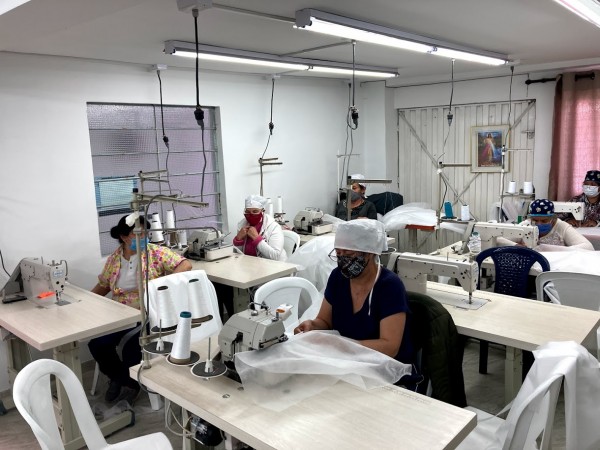
In Colombia, the annual school calendar begins in February and ends at the end of November, and the educational programs that the CSP develops in “Casa Garavito” follow this same calendar. After a 2020 marked by the restrictions imposed by the pandemic, in 2021 the academic year has started with optimism, despite the fact that the situation continues to be delicate.
In this new school year, we asked the teacher of the Sewing courses to work twenty hours a week (eight more than in the past), in order to accommodate the students in smaller groups, in which the social distance can be preserved. She accepted the proposal, and on February 1st she started with eight groups of six students each, for a total of 48 students (and we have a waiting list). Five groups are made up of women who had already started their training in previous years, and there are three new groups, of students who are just beginning their instruction in the use of sewing machines.
In addition, the teacher who offers tutoring classes to primary school boys and girls also started the first week of February with a total of 20 students (the size of the classroom that we use for this program, with the biosecurity measures, makes it impossible to increase this number), divided into four groups, which he attends every afternoon, from Tuesday to Friday.
In 2021 we have also expanded the hours of service of the two therapists who offer psychological support to people in the neighborhood: currently, between the two of them they work 25 hours a week. They are seeing fifty patients.
Likewise, the nurse that the CSP hired in 2020 to make home visits to sick people in the neighborhoods where we work continues to be dedicated to this project, seeing an average of 10 to 15 patients per week.
At the end of February, we also started again the guitar classes for children at Casa Garavito, which were interrupted a year ago due to the pandemic. For obvious reasons, we have not yet been able to restart the training classes for the elderly. To do so we are waiting for the situation to improve, although several elders from the neighborhood have already expressed their wish that we do not delay too long, because they do miss their classes!
With the arrival in Colombia of Fr. Michael Wolfe to work at La Resurrección parish
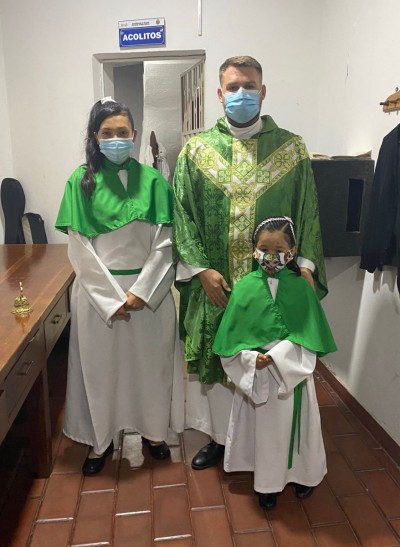
In the middle of last October Fr. Michael Wolfe moved from the Dominican Republic—where he finished his work as pastor of La Sagrada Familia, in Sabana Yegua—to Bogotá, Colombia. Mike, a priest of the Archdiocese of Milwaukee and a member of the Community of Saint Paul, arrives in Bogotá to work in La Resurrección parish, in the south of the Colombian capital, together with Fr. Martí Colom. The CSP has been present in La Resurrección since 2016.
Now, with Mike’s arrival, the presence of two priests will help to better develop the pastoral and human promotion tasks that we have been carrying out in the three neighborhoods that make up the parish territory. They include the celebration of the sacraments in the parish’s three centers of worship, the organization of the various pastoral ministries and also the social projects that are carried out at “Casa Garavito”, the CSP’s community development center located in El Pesebre neighborhood.
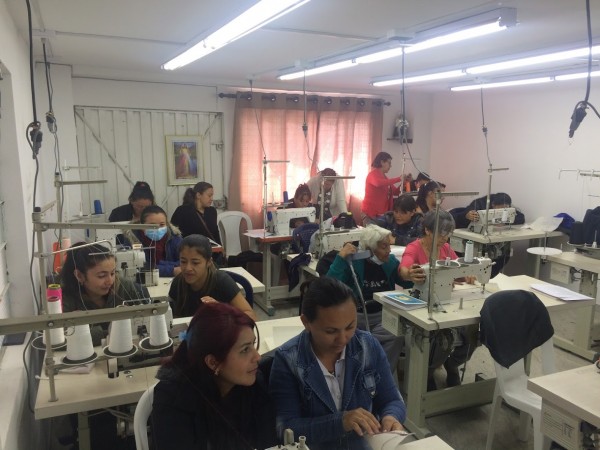
After the period of vacations (which in Colombia takes place during the months of December and January), at the beginning of February the various programs that take place at Casa Garavito Community Development Center of the Community of Saint Paul in Bogotá began their usual activities.
We are very pleased to note that, this year, enrollment for the various courses and programs offered at our community center has been greater than in previous years. The number of people interested in the women's cutting and sewing workshop, in particular, has increased significantly. If in 2019 we had a total of 50 women in the different courses of this program, in 2020, 85 women are participating in it (divided into four different groups). It is a joy to see the interest that this project has generated within the community.
On the other hand, the rest of the Casa Garavito programs have also started the year on the right foot: 30 children participate in English classes, 30 young people in guitar lessons, 20 grandparents and grandmothers in general education classes for the elderly , and 15 children in school reinforcement classes. The psychologist who offers her services to people who request them visits the Casa every Wednesday for six hours and, on the other hand, this year Casa Garavito hosts a new handicraft course, attended by 12 people, which meets the Saturdays in the morning.
From here we would like to thank the many volunteers and collaborators that make it possible for Casa Garavito to remain a place of encounter, learning and hope in the El Pesebre neighborhood of Bogotá.

The Community of Saint Paul expands its programs in Bogotá (Colombia) with the services of a psychologist
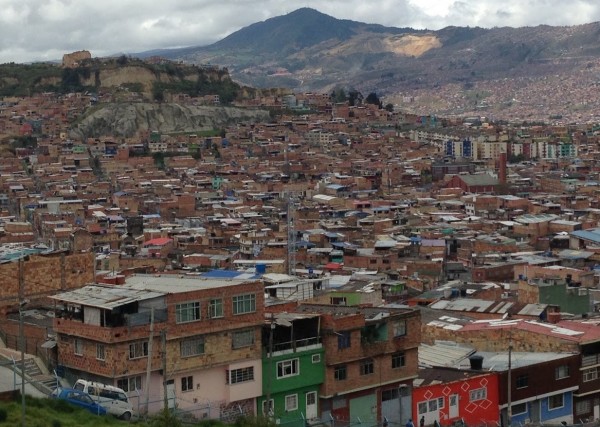
Since the beginning of July, the “Casa Garavito Development Center” of the Community of Saint Paul in El Pesebre neighborhood of Bogotá, has the help of a psychologist who, once a week, on Tuesdays, attends to people who need her assistance.
This new program has been very well received by the residents of El Pesebre and Granjas de San Pablo (the neighborhood adjacent to El Pesebre). In fact, a few days after announcing to the community that the psychologist would begin her work, the appointment schedule with adults, young people, children and families which showed interest in seeing her had already been filled.
For most people in these low-income neighborhoods it is not easy to obtain psychological assistance, due to its high costs and the poor health system in the country. Consequently, it is great news to have right here in the area a professional who attends those who ask for it for free, offering her listening skills, guidance and support.
With the beginning of the school year, the various educational programs of the Community of Saint Paul in Casa Garavito Community Development Center in Bogotá (Colombia) have begun
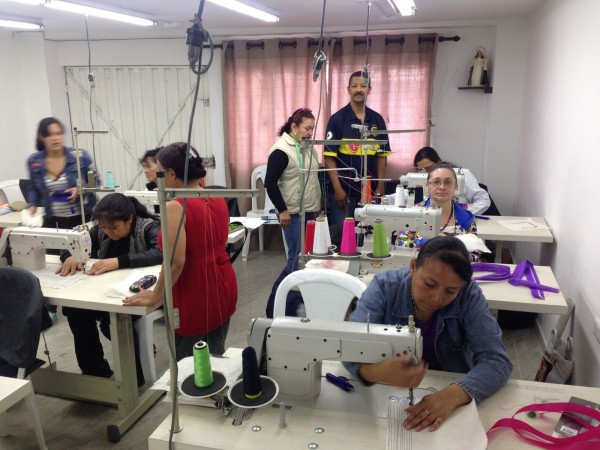
In Colombia, the school calendar runs from February to November, so that students' longer vacations, which in other countries are in July and August, take place in December and January. With the start of the academic year in the schools and universities throughout the country, we have also started the various educational programs that operate in the Casa Garavito Community Development Center, which the Community of Saint Paul runs in the El Pesebre neighborhood in Bogota.
This year we have launched two groups of new students for the Sewing classes. Adding the people who have registered to start from scratch to those who will continue their training from last year, there are now 50 people (mostly women, although also some men accompany them) in these courses.
Another program that also started the first Saturday of February was the education for the group of elderly who have been receiving academic formation since 2017. We are very happy to report that this year several new students have joined this group. Today around twenty older adults meet, pen and paper in hand, every Saturday at “Casa Garavito” for their classes.
The guitar lessons for children and young people have started as well. Additionally, we are now enrolling children and teenagers to take Basic English classes, a new initiative which will begin in April. This will undoubtedly be a good complement to the rest of the programs, and many people have already shown interest in it.
From “Casa Garavito” (where other pastoral programs take place, such as a weekly Bible workshop and a youth group) we continue to coordinate our university scholarship program. In 2019 we will be assisting 22 students from the neighborhood so that they may continue their university studies.
Finally, a new initiative of the Community of Saint Paul in Bogota for this 2019 is that we have started a collaboration with a local foundation (“Solidarity, Strength of the Little Ones”) that for some years has served people with mental disabilities. Thanks to the CSP’s involvement, the men and women cared for the foundation have now activities organized for them three days a week (before, they were only gathering once a week).
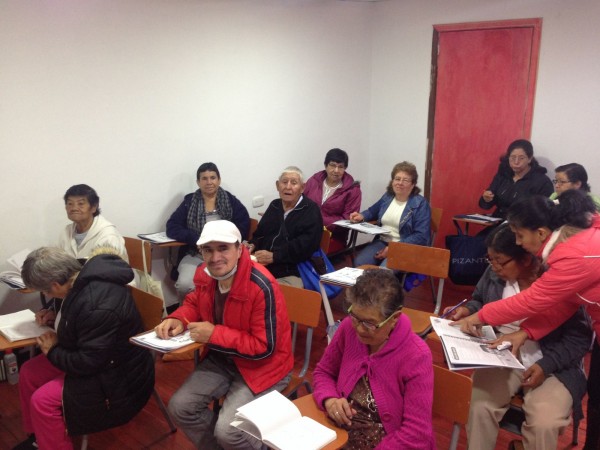
The CSP has a small presence in La Picota, the largest prison in Bogota (Colombia)
On the last Thursday of every month, the members of the Community of Saint Paul that live in Colombia know that we will have a different day: we leave aside our projects in La Resurrección, the parish where we work, and go to La Picota, the largest prison in Bogota, to accompany for a few hours the inmates who are there. We talk with them, we celebrate the Eucharist and we try to comfort them with our visit.
La Picota houses an average of 9,000 men and is a complex world—like all prisons—, sometimes difficult to understand, and undoubtedly very much in need. It is obvious that our work, there, is minimal, a mere witness: we simply join many other volunteers from various parishes in the capital that every Thursday, without exception, go to La Picota to put in practice Jesus’s words: «I was in the jail and you went to see me». It is a great satisfaction to be part of this happy and dedicated group of volunteers.
Something interesting happens with jail ministry: those who do not know it, look at it with misgivings; on the other hand, those who have the opportunity to get involved with it, fall in love with it. It is true that suspicions and even fears are common at first, and that for the person who has never entered a prison, the first day entails a natural nervousness. However, the common experience of the vast majority of those who decide to visit the prisoners is extraordinarily positive. The human contact with the inmates helps to make prejudices go away, and we discover the lively presence of God in a place where perhaps we did not think we were going to find it. The members of the CSP that have the privilege of going to La Picota would not hesitate to affirm that some of the deepest human and spiritual experiences we have lived here in Colombia have taken place precisely behind the bars of this prison. And we are sure that the same would be affirmed by all the volunteers who, with an admirable generosity, show up at the gates of La Picota every Thursday of the year. It is a different ministry, and it is very worthwhile: it never disappoints.
Students of the sewing course of the Community of Saint Paul in Bogotá organize an exhibition with garments made by them
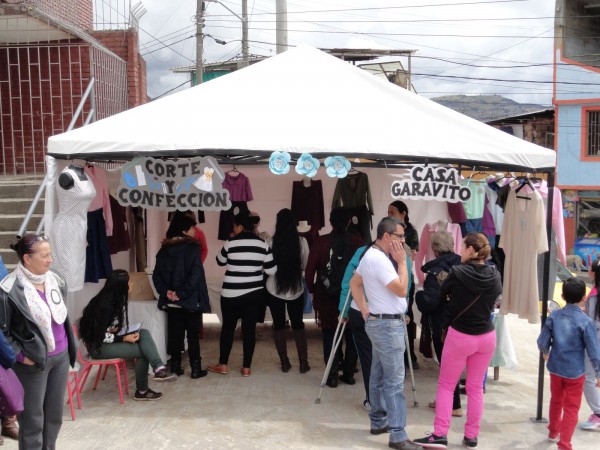
On August 5, the first exhibition of garments made by the women of the Sewing workshop that the Community of Saint Paul established a year ago in the south of Bogotá (Colombia), took place at La Resurrección parish. The exhibition was a very positive experience, both for the women who are part of the project, who were able to make their work known to others, and for the parish community, who had the opportunity to appreciate the fruits of the workshop. Several people, seeing the good quality of the exposed clothes, ordered women's dresses, blouses and jackets.
This exhibition has been carried out thanks to the perseverance and commitment of the group of women who, after a year of training, now arrive at the end of the first stage of the process. And they are already very excited about the next stage: establishing a productive cooperative through which the learning they have received can result in direct benefits for the families of these women. To all the participants in our sewing center, we want to say: congratulations, and let’s keep going!
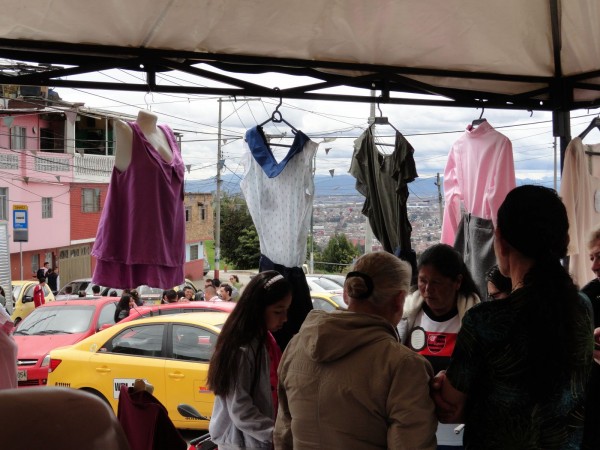
Thirty children and teenagers sign up for the music classes that the CSP has started in the Pesebre neighborhood of Bogotá
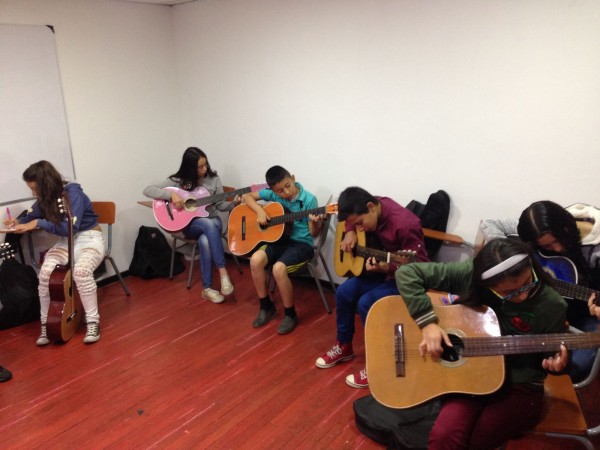
The Community Development Center "Casa Garavito", which we inaugurated last April in El Pesebre neighborhood of Bogotá, is already working at a good pace. The last initiative that we started in the center's facilities (besides the sewing courses for women, training classes for the elderly, library, meetings of a youth group and a weekly Bible workshop) has been a guitar course for children and young people from the area.
We announced this new activity in the neighborhood and in a few days thirty children and teenagers were enrolled. We divided them into two groups, and the classes have been going very smoothly every Saturday since mid-June. For now, the future guitarists are enthusiastic about what they are learning, and Manuel, the instructor, assures us that the students are joyful and talented.
There is no doubt that music is very attractive to many people, perhaps especially among to the youth. In that sense, we are very happy to offer a service like this in a neighborhood where the opportunities to learn how to play an instrument are very scarce.
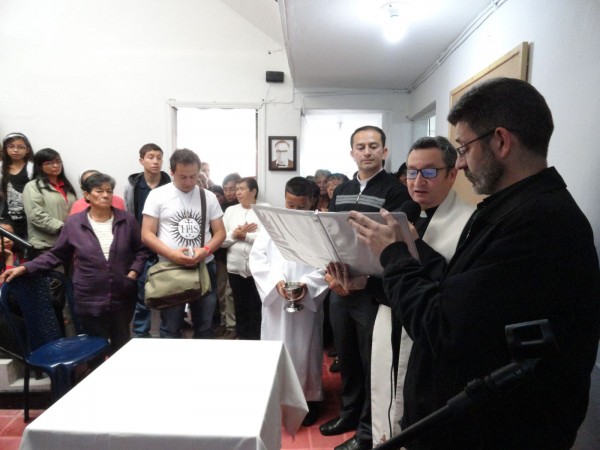
On April 15 took place the inauguration and blessing of the new Community Development Center that the Community of Saint Paul has established in the El Pesebre neighborhood of Bogotá (Colombia).
This Community Development Center has been baptized as “Casa Garavito”, in memory of Fr. Alfonso Garavito Rodríguez, a priest from Bogotá who from the mid-60s to his death in 2006 exercised his ministry, with exemplary dedication, in the southern side of the Colombian capital. For a time, he even resided in the house that, now, the CSP has rented and arranged to be used for pastoral purposes.
In the premises of the Center, the Sewing Workshop established by the CSP has already been in operation for several weeks. Thirty women are currently being trained there. Soon, we will also transfer there the classes we offer to a group of older adults in the neighborhood, as well as a small library, school reinforcement classes and catechesis for children and young people.
For the blessing of the Center we had the presence of Msgr. Alberto Forero Castro, Vicar of the Pastoral Region of Bogotá in whose territory is located the Pesebre neighborhood. A good number of neighbors and members of the local community also participated in the celebration.
It is our wish that the new Community Development Center “Casa Garavito” may contribute to the wellbeing of the section of Bogotá where it is located, becoming a place where many people may be trained to face, with the right tools, the many challenges that life poses to them.
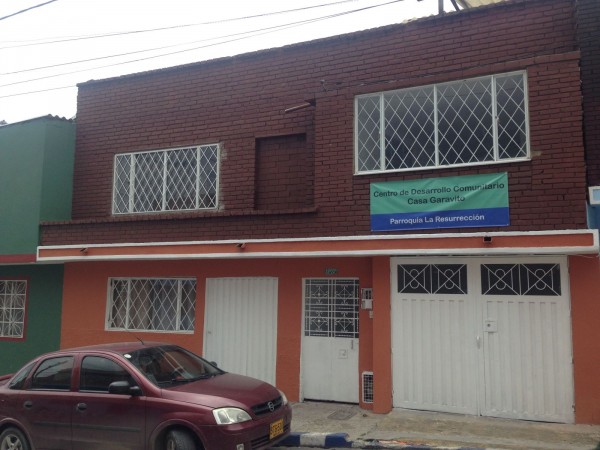
The Community of Saint Paul has established a Sewing Center in the neighborhood called Granjas de San Pablo in Bogotá, Colombia
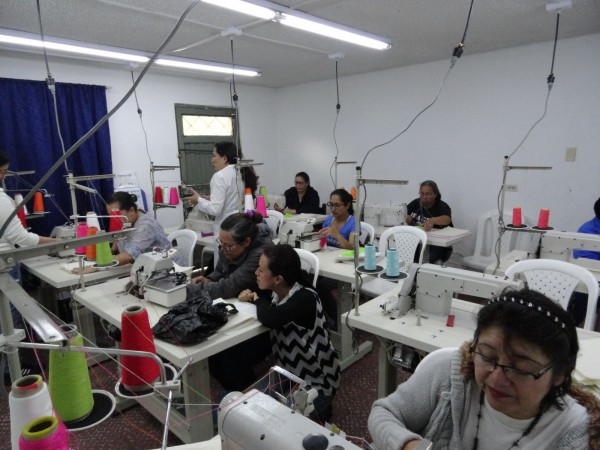
As an extension of the pastoral work and the development projects that the CSP is developing in the south of Bogotá, we have started a new program: the establishment of a training workshop for women, in which they are offered sewing classes.
After several meetings with women from the neighborhood who were interested in being able to receive formation in some field, so that in the future they could be able to help sustain their families, we decided that sewing was the best option. Once this decision was made, we started looking for the person who could give the courses, and we were fortunate to find an instructor who has been teaching dressmaking courses in different institutions in Bogotá for more than twenty years, and who was willing to offer her services. Then we acquired nine industrial sewing machines and we proceeded to establish the workshop in the premises of a neighborhood association in Granjas de San Pablo.
The first group of students is made up of 16 women. They registered with the goal of completing two semesters of training. Classes take place three days a week in the afternoon hours. When they finish the second semester, the CSP will help the participants that wish to organize themselves as a small company to producing clothing (blouses, skirts, underwear, sportswear ...). Then, using the same machines as the project, they will be able to start to market their products and thus help their families.
It is great to see the enthusiasm with which the students have welcomed this project, and also the atmosphere of camaraderie and solidarity that has been created between them. In February 2018, when the new school year begins in Colombia, we will start with a new group of students, while the first ones continue with their second semester of training.
From here we would like to thank all the institutions and people who with their contributions have helped us to establish this training center, and help us to maintain it.
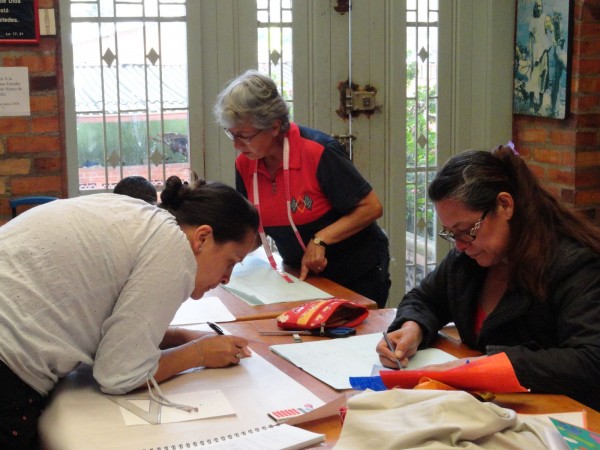
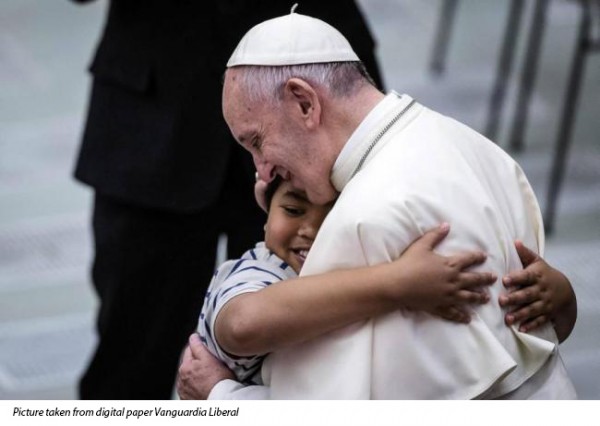
As it was reported by the media throughout the world, from the 6th to the 10th of this month of September, the Pope made his expected apostolic visit to Colombia. It was five very intense days. Intense and exhausting, in the first place, no doubt, for Francis himself, who was in Bogotá, Villavicencio, Medellín and Cartagena presiding at huge gatherings (in each of these cities, those attending the events surpassed all the organizers’ projections), celebrating the Eucharist and having an endless number of meetings: with representatives of the Colombian government, with the youth, with victims of the armed conflict, with religious, with bishops, with people who crowded the streets through which he passed and with those who spontaneously concentrated around of the Apostolic Nunciature of Bogotá, where he stayed. It was also an intense visit for all those who followed it closely: the days were very rich in gestures, in moving moments, in strong messages that deeply touched the country.
Francis had said that he would go to Colombia when the government and the guerrilla would have signed the peace agreement that ends more than 50 years of armed conflict. He has fulfilled his promise, making of his trip an invitation to the reconciliation of all those whom war and violence have confronted for so long.
One reflects now on the pope's visit and realizes that he has left us a universal message: that is, a message that goes beyond the Colombian situation, that transcends it, and that we all can apply to ourselves, whether we are in Colombia or not, if we are concerned about conflicts and violence, if we long for paths to peace and reconciliation. Francis, in his clear and transparent language, has invited us not to be spectators in the construction of peace: “When the victims overcome the understandable temptation of revenge, they become the most credible protagonists of peace-building processes. It is necessary that some are willing to take the first step in this direction” (Homily in Villavicencio, September 8). Again and again, the pope has insisted that we should not resist reconciliation, that we should not be afraid “to ask forgiveness and to offer forgiveness”: “It is time to deactivate all hatred” (Prayer for National Reconciliation, Villavicencio, September 8).
In a world where so many quickly gravitate towards resentment and revenge, and where conflicts, real or imagined, tend to become entrenched, this recommendation (“it is time to deactivate all hatred”) seems essential to us. Essential, in spite of its difficulties. Francis knows how to make his invitation sound as achievable (because it truly is!), the very same invitation that, in somebody else’s mouth, would seem like a fantasy or an empty plea. Deactivate hatred. Forgive. Why not? The gentleness that emanates from the Pope, with his simplicity and lavish smile, enables him to communicate, without offending anyone, a message that in the mouth of another would seem too harsh, and it would most likely be rejected.
A taxi driver from Bogotá expressed this same thought very frankly, and with a certain astonishment, the afternoon of the Sunday when the Pope had finished his visit and had just embarked on his flight to return to Rome. “If someone else told me the things he says, I would not want to hear him. But this old guy has a way of correcting you that makes you pay attention. When I saw on TV that he went into the plane to fly away, I burst into tears.” Francis’ visit to Colombia could not be better summarized.

In the Community of Saint Paul, we firmly believe that access to quality education, from early childhood until college, is the indispensable key to the authentic and long-term development of people and communities. Without good formation, it will be very difficult for the most vulnerable sectors of society to move out of poverty. Only education will provide these sectors with the tools they need to positively work on their own development. That is why, for a long time now, in most places where we work, we think about what we can do to guarantee the access of low-income people to a quality academic education.
In this vein, we recently started a scholarship program for university students in Bogotá. As we have repeatedly reported on this blog, since January 2016 CSP members are working in the neighborhoods of La Resurrección, Granjas de San Pablo and El Pesebre, in the south of the Colombian capital. Since then, we have met many young people from these neighborhoods who, once they finish high school, want to go to college, but because of a lack of resources they cannot fulfill their yearning. In order to respond to this need, we have established a scholarship program, though which we are already collaborating with a dozen young people in the first semester (from August to December 2017), facilitating, with small scholarships of support, that they may go to college. Most have enrolled in one of Bogota's several Colombian public universities, whose costs are naturally lower than in private universities. The CSP scholarship consists of paying for its semester enrollment and monthly expenses for transportation and materials.
At the moment, it is a very modest initiative that we hope it can grow with time. So far, we are delighted with the enthusiasm with which each of the students who have approached us has taken up the challenge of going to university, well aware that this is the best way for their personal development, and that of their community.
The CSP begins a new program for senior citizens in El Pesebre neighborhood of the Colombian capital
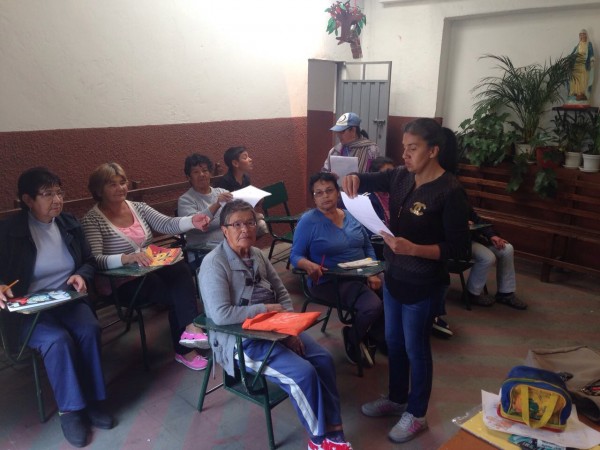
Last August we informed in this blog that the Community of St. Paul had started an after-school program for children in El Pesebre neighborhood in Bogotá. This program has a double goal: first, to help academically children aged 8 to 12 who need assistance with their studies; secondly, to offer them a safe environment where they can go in the afternoons and thus avoid that, by being on the street, they may fall into consumption of drugs. The project has been functioning with normality since its beginning. What we never expected was that such a program would be the trigger for another one: seeing that the parish facilities of the neighborhood opened several afternoons a week for the children, a few senior citizens came to us with a simple petition: «Can you teach us as well?»
It turns out that several grandparents in the district, who were born in rural provinces of the country and moved to Bogotá many decades ago, have had a long life of hard work and have never had the time to care for their intellectual formation. Some are illiterate, others know how to read and write, but barely, and do not have many knowledge of mathematics, history, geography…
We searched for a teacher from the same area willing to take on this task, and at the beginning of March we opened our new Educational Program for the Elderly. It operates every Saturday morning, and a dozen of grandmothers (they seem to be more interested than the men!) and one grandfather are already enrolled. They do not miss one class, are very attentive (in fact, they take their studies very seriously). For us it is a real joy to see them week after week, sitting in their desks and learning so many things that when they were children never had the opportunity to study.
The Community of Saint Paul starts an after school program in Pesebre, a neighborhood in the south of Bogotá
Since last January, members of the CSP have worked in La Resurrección Parish, located in the southern part of Bogotá. The parish territory includes La Resurrección, Granjas de San Pablo and Pesebre neighborhoods: these are humble, working-class areas of the Colombian capital, mostly layer 2 on the socioeconomic classification of the City of Bogota (which lists the neighborhoods of the capital from 1 to 6, with 1 being the areas with least resources and 6 the wealthiest).
These sectors face a remarkable variety of challenges, from the overcrowding of people in homes of poor quality to the difficulties of families in obtaining quality health services; from the few job opportunities for young people to the abandonment of many elderly. However, after listening in various meetings to the population of these neighborhoods, we soon found that one problem concerns them more than any other: the insecurity prevailing in the streets, directly related to the consumption of narcotic substances by many young people, who commit crimes to obtain resources to be able to use drugs. Drug dependence, in turn linked to the lack of opportunities that many young people face, is a real epidemic in these neighborhoods, where everyone recognizes the existence of several "ollas"—literally, “cooking pots”, that is, spots where drugs are sold in the streets of the capital by the nets of trafficking.
Many people have told us about a dramatic new concern: increased drug use among children of progressively younger ages. If a few years ago those who fell into drug dependence were generally kids older than sixteen or seventeen, the need of the drug dealers to expand the sale of their substances has now made it common that children aged nine, ten and eleven may start using them.
While recognizing the magnitude of the problem, and that all our efforts will just be a drop of water in a great ocean, we considered what to do to help, even in a modest way, to curb this trend. We decided to offer tutoring classes in the evenings, on the premises of the parish in the Pesebre neighborhood. We started in late July: fifteen children between 8 and 12 years were enrolled on the first day, and we hope that this service will keep growing. Part of the problem is that many children who go to school in the morning are by themselves when they come home at two or three in the afternoon, since their parents are away at work, many until late into the night. These children then have no one to help them do their homework or to prevent them from leaving and wandering the streets until dusk, which obviously makes it easier for them to end up falling into the networks of consumption. Our proposal is very simple: to provide a space where these children can go after school, and where they will be helped to advance in their studies, with tutoring and room assignments, and thus perhaps prevent drug dependence from taking over their lives. We have just started. We hope that this becomes a long-term project that may bear some fruit!









